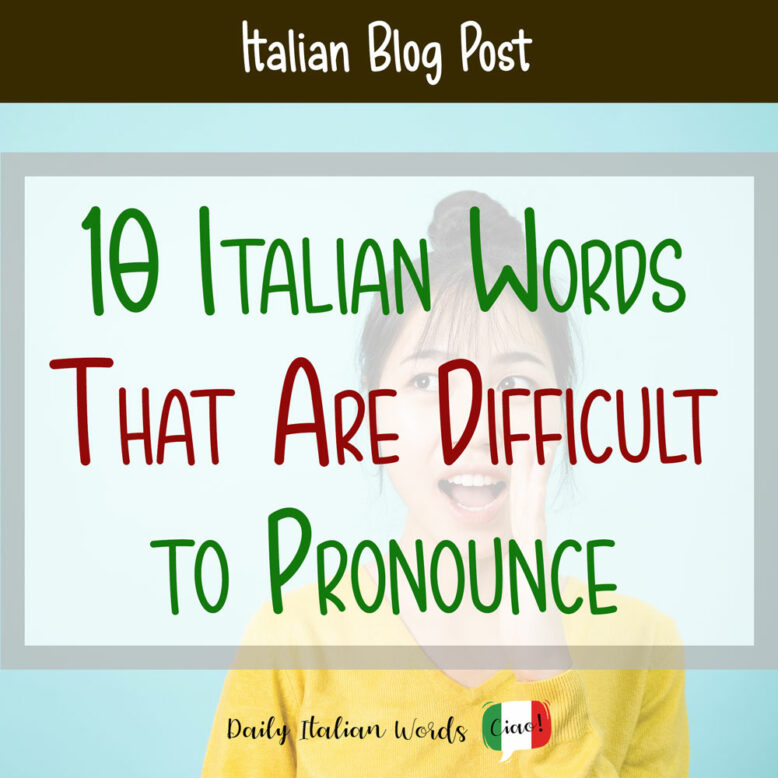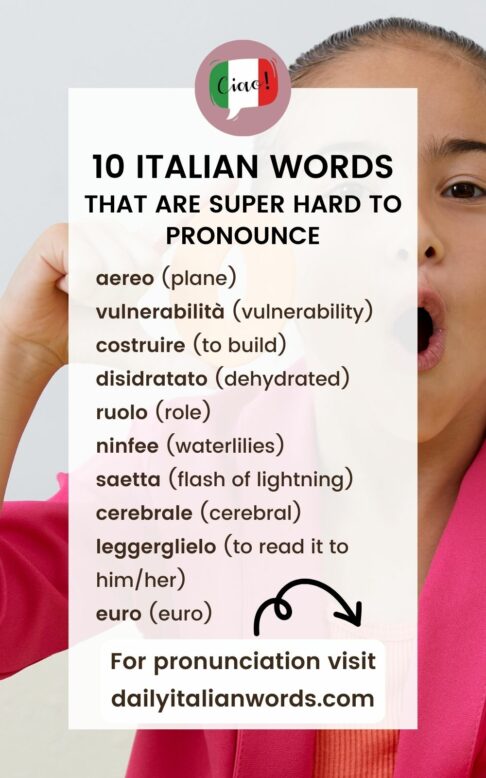Most learners will agree that Italian, on the whole, is a fairly easy language to pronounce. It doesn’t have as many sounds as other languages (yes, English, I’m looking at you), nor as many complex consonant clusters. Still, there are a few words that can present a challenge to English speakers, even after years of studying and speaking the language on a daily basis. Here are some of the trickiest words that trip me up to this day!

1. Aereo (plane)
Aereo is problematic for English speakers because we aren’t used to clearly pronouncing so many vowels in one word. We are tempted to drop vowels (“air-eo”), or transform the second e into an i sound. To pronounce aereo correctly, you need to give each and every vowel importance.

2. Vulnerabilità (vulnerability)
Whenever I try to pronounce this particular word, it consistently comes out garbled. I can’t quite pinpoint whether it’s the word’s length or the combination of uln that causes the issue, but whatever the reason, it makes me strongly inclined to avoid saying it!

3. Costruire (to build / construct)
I mentioned in the introduction that Italian doesn’t have many consonant clusters, but the ones it does have can be tricky to get your mouth around, like the str in costruire. I blame it on that pesky rolled r!

4. Disidratato (dehydrated)
When I go to pronounce this word, I tend to mix up the syllables di–si–dra, or leave one of them out. Please tell me I’m not alone!

5. Ruolo (role)
The letter “r” is already difficult to pronounce for English speakers, but it becomes extra difficult when followed by two round vowels.

6. Ninfee (waterlilies)
On the surface, ninfee (which is the plural of ninfea) may not look overly challenging but for English speakers, it can be hard to avoid pronouncing the double E as if it were the diphthong /eɪ/ (as in the words “hey” or “bake”).

7. Saetta (flash of lightning)
I have a tendency to pronounce the “e” in this particular word as an open “e” instead of a closed “e.” It may seem like a minor mistake, but my husband never fails to point it out!

8. Cerebrale (cerebral)
I surely can’t be the only one who constantly swaps the Rs for the Ls in this word, can I? (And it usually comes out worse if I think about it beforehand!)

9. Leggerglielo (to read it to him/her)
Leggerglielo isn’t a single word but the combination of leggere (to read) + gli (to him/her) + lo (it). Personally, I find this combination almost impossible to pronounce without stumbling over the “r” or “gli” sounds. How about you?
10. Euro
When I encounter this word, my natural inclination is to pronounce it in the English manner, where it sounds like “yur-oh.” However, in Italian, it is necessary to emphasise each vowel individually, and remember that it consists of three syllables, not two.

Are there any Italian words that you struggle to pronounce? Share them with us in the comments below!

Also be sure to check out:
- 8 Italian Sounds English Speakers Struggle to Pronounce Correctly
- 15 Commonly Mispronounced Italian Food Words
- 10 Italian Words You’ve Been Saying Wrong (and How to Pronounce Them Correctly)
- 10 Italian Words That Are Difficult to Pronounce For English Speakers
Heather Broster is a graduate with honours in linguistics from the University of Western Ontario. She is an aspiring polyglot, proficient in English and Italian, as well as Japanese, Welsh, and French to varying degrees of fluency. Originally from Toronto, Heather has resided in various countries, notably Italy for a period of six years. Her primary focus lies in the fields of language acquisition, education, and bilingual instruction.


